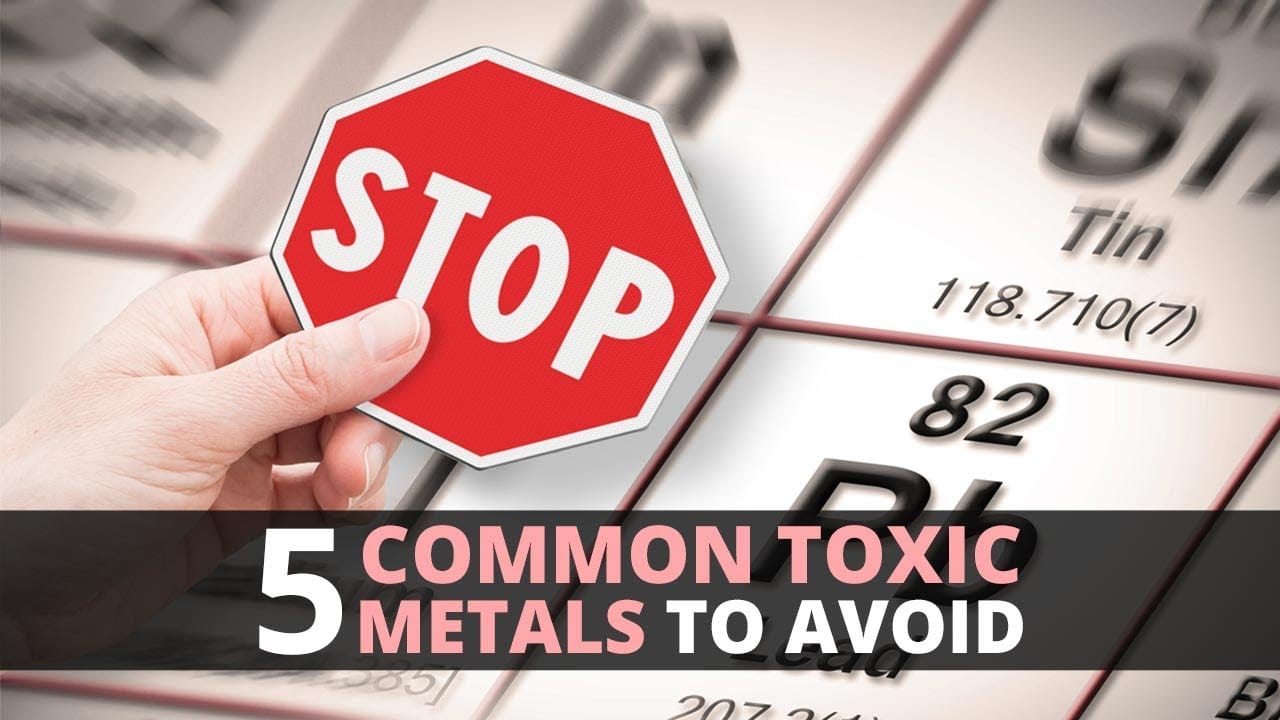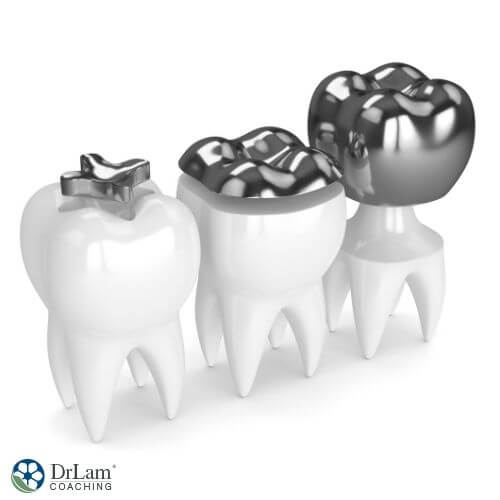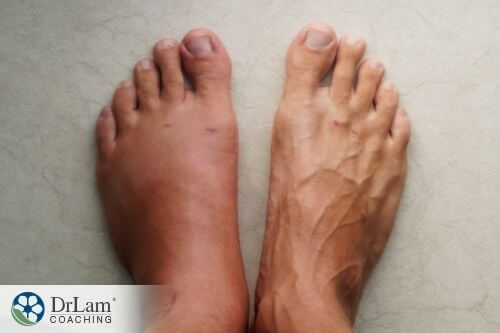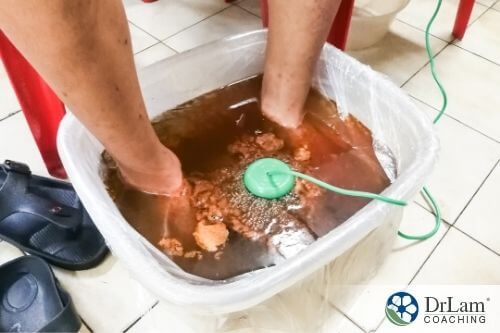
You can get heavy metal poisoning after exposure to large quantities of heavy metals. Some of these include lead, mercury, arsenic, copper, cadmium, iron, zinc, chromium, and manganese. Your body can tolerate, and even requires, many of these metals. But only in small quantities. It’s overexposure that is problematic.
» Read our complete long-read article on heavy metal poisoning
» Adrenal Fatigue FAQs
» Take our 3-minute test to see if you may have Adrenal Fatigue
 Heavy metal poisoning can happen if you are exposed to a large quantity all at once or if you are exposed consistently over a long period of time. The first case is considered acute and the second is more chronic. In this article, we'll be focusing on the chronic type, as it's more common and requires a different recovery strategy.
Heavy metal poisoning can happen if you are exposed to a large quantity all at once or if you are exposed consistently over a long period of time. The first case is considered acute and the second is more chronic. In this article, we'll be focusing on the chronic type, as it's more common and requires a different recovery strategy.
Chronic heavy metal poisoning comes from lower levels of exposure that happens frequently. For example, you might be eating contaminated food or drinking contaminated water. The most common sources are insecticides, pesticides, and herbicides. You could also be breathing contaminated air, or using containers, cookware, and tableware that are coated with a substance that leaks out heavy metals. Overdoing it with certain medications and having lead paint in your home or office can also cause chronic heavy metal poisoning.
Chronic heavy metal poisoning symptoms can include:
Some of these above symptoms are present in many other conditions. And because true heavy metal poisoning is rare, especially in the US and other developed countries, it’s not something most people would think of when presented with these symptoms.
However, there is an easy way to check for heavy metal poisoning. A heavy metals panel or toxicity test requires a small blood sample. In some cases, your results may not show you have high levels of any of these metals yet your doctor might still suspect you have some kind of heavy metal toxicity. In that case, you might need to do other tests, such as urine analysis, fingernail analysis, hair analysis, kidney function, liver function, x-ray, and ECG.
Some of these tests look for either the heavy metals accumulated in the organs or check for possible damage that these metals had on your organs. For example, lead poisoning tends to damage reproductive organs, while arsenic can cause neurological damage. Cadmium can lead to damage to the lungs and kidneys, while mercury can lead to lung, brain, eye, skin, and gastrointestinal damage.
Besides the damage to specific organs, heavy metal poisoning can also cause issues such as Adrenal Fatigue Syndrome (AFS) and NeuroEndoMetabolic (NEM) dysregulation. That’s because you get these conditions thanks to chronic stress. And heavy metal toxicity, especially if chronic, is a huge stressor on the body.
This means that you may not only need to detoxify your body from the heavy metals, but you may also need to find ways to repair the damage that’s been done and recover from AFS and NEM dysregulation.
 Your NEM stress response is your body’s global response to stress, and it’s made up of six circuits of organs and systems that work together to fight stress. They are the Hormone, the Bioenergetics, the Cardionomic, the Neuroaffect, the Inflammation, and the Detoxification circuits. And although all six are affected by heavy metal build-up, the ones that are most on the line here are the Detoxification and the Inflammation circuits.
Your NEM stress response is your body’s global response to stress, and it’s made up of six circuits of organs and systems that work together to fight stress. They are the Hormone, the Bioenergetics, the Cardionomic, the Neuroaffect, the Inflammation, and the Detoxification circuits. And although all six are affected by heavy metal build-up, the ones that are most on the line here are the Detoxification and the Inflammation circuits.
Your liver, interstitium (extracellular matrix), and immune system make up your Detoxification Circuit. When heavy metals enter your body, your immune system tries to isolate and attack them. And it creates inflammation to do that. As for your liver, it is your body’s main clearinghouse. It works by breaking down the different substances so that your body can then get rid of them through urine, sweat, and stool. To travel between your cells, liver, and other excretory systems, the substances need to go through the interstitium.
Unfortunately, however, your Detoxification Circuit and its components can dysregulate when your body is under constant stress, as is the case with chronic heavy metal poisoning. And when that happens, your detoxification processes slow down and become congested. That allows for even more toxic build-up to happen, which leads to more inflammation.
Inflammation in and of itself is a healthy and necessary response. You need it to fend off viruses, bacteria, and toxic substances. It also helps get rid of dead and damaged cells, making room for new cells.
But when inflammation gets out of control, it can then become a bigger risk than the original insult that started the inflammatory response in the first place. Inflammation can spread to different parts of your body and create pain and damage there. For example, inflammation that travels to the joints can cause joint pain, and inflammation that travels to the central nervous system can cause neurological and psychiatric symptoms.
Chronic inflammation, just like chronic heavy metal poisoning, is another huge stressor on your body. And whenever you’re facing chronic stress, your adrenal glands have to secrete more cortisol. Cortisol is your body’s main anti-stress hormone, and one of its jobs is to neutralize inflammation. But if your adrenals have to work constantly to keep inflammation down, they will become exhausted at some point.
That’s one way to get AFS.
Symptoms of AFS include fatigue, weight gain, sleep problems, anxiety, mild depression, brain fog, dry skin, hair loss, loss of libido, PMS, infertility, salt and sugar craving, hypoglycemia, food, and drug sensitivities, lowered immunity, frequent colds and flu, heart palpitations, and unstable blood pressure, among others.
Inflammation can either cause or aggravate some of the symptoms above. For example, we mentioned how inflammation that travels to the central nervous system can cause neurological or psychiatric symptoms. So the brain fog, anxiety, mild depression, and sleep disturbances that you see in AFS might be due to the increased inflammation.
The symptom of food and drug sensitivities may be due to the fact that when you have AFS, your Detoxification Circuit slows down, so your body doesn’t process and eliminate the metabolic by-products of these foods and drugs well. They then stay longer in your system, building up, and causing inflammation as well. In fact, these foods and drugs may contain trace amounts of heavy metals. But as you ingest them more and more, and your body doesn't eliminate them fast enough, their levels get closer to the threshold of poisoning.
And what happens when the toxicity builds up in your system due to slowed detoxification? It then adds more pressure on your adrenals and your NEM, which then slows detoxification and increases inflammation even more. This vicious cycle will continue unless you intervene. And with each repetition, it will incur more and more damage. And at some point, the damage might be so severe that it is irreversible.
That’s why it’s really important that you catch this toxic build-up as early as possible. You will need to come up with a holistic recovery plan with your doctor that may involve some form of detoxification as well as addressing any damage that may have already happened. It would also be wise to deal with any AFS and NEM dysregulation and to get your Detoxification circuit fully functioning again.
The most well-known therapy for heavy metal poisoning is chelation. You use substances that bind to the heavy metal, rendering it inactive and making it easier for your body to excrete it. You can get chelation therapy via injections or pills. The most common chelating agents are dimercaprol, calcium disodium EDTA, and penicillamine.
The FDA approves of chelation for treating heavy metal poisoning. But some health professionals have tried to use it to alleviate other health problems, such as heart disease, neurodegenerative diseases, and autism. But there isn’t enough scientific evidence that supports these uses, and indeed, this kind of use may have adverse effects.
Because chelating substances can also deplete your body of minerals that you actually need, they are sometimes infused with such minerals. And, because of this possibility, you should be careful when considering chelation for non-acute poisoning.
Other possible therapies for heavy metal poisoning include hemodialysis, where you get your blood cleaned using a dialysis machine.
You might also have your stomach pumped if you accidentally ingest a large quantity of heavy metal. Oral activated charcoal can also be useful for this since it soaks up the content in your stomach.
If you don't want to use heavy duty chelation, there are gentler options like liposomal glutathione and vegetable greens to help draw these metals out slowly and steadily.
Those with adrenal fatigue and detoxification issues would likely do better to consider these gentler options so as to prevent a severe reaction. Too many heavy metals coming out suddenly can overload the body's detox systems, backfiring and causing serious symptoms.
 Some medical professionals don’t use any type of detoxification. Some will overdo it and use chelation, for example, when it’s not needed. At our clinic, we take it case by case and prefer to use gentler forms of detoxification. This is better for adrenal fatigue, especially in the more advanced stages, as detoxification can be a form of added stress.
Some medical professionals don’t use any type of detoxification. Some will overdo it and use chelation, for example, when it’s not needed. At our clinic, we take it case by case and prefer to use gentler forms of detoxification. This is better for adrenal fatigue, especially in the more advanced stages, as detoxification can be a form of added stress.
At the same time, we don’t rule detoxification out completely as it can be a very useful tool when used in tandem with other recovery methods. For example, when you are going through an adrenal fatigue recovery plan, you will eat an adrenal fatigue diet, take up some stress management techniques, follow a gentle supplements protocol, practice good sleep hygiene practices, and do some gentle forms of exercise, like adrenal breathing and adrenal yoga exercises.
Once you have all of these pieces in place, you might benefit from a very gentle detox. This can include certain natural herbs, antioxidants, and adjustments to your diet that help with detoxification. It is important that you have close supervision during the entire process and make any needed changes along the way. This is the kind of plan we do with our clients, and we sometimes also incorporate therapies, like IV and oxygen therapy.
Another key piece of detoxification is to remove the sources of the toxins involved in the heavy metal poisoning. This could include:
There are different types of heavy metal poisoning, depending on the severity of exposure and type of heavy metal. In rare cases, it can be an emergency and you may need chelation and other urgent interventions. More commonly, you will just need to stop exposure and then take up some dietary and lifestyle changes that support your body’s natural detoxification. You can also add a gentle detoxification protocol to help the process along.
If you have AFS, it’s very likely that your Detoxification Circuit is already slowed and congested. That’s because when you have AFS, all non-essential systems slow down so your body can conserve energy. But that makes it easier to accumulate toxins and even end up with chronic heavy metal poisoning. That’s why, once your recovery is moving along, you might want to consider a gentle detox as well.
If you have questions about heavy metal poisoning, adrenal fatigue, or Detoxification Circuit dysfunction, you can contact the Dr. Lam Coaching team. We can offer you a free** no-obligation phone consultation at +1 (626) 571-1234 where we will privately discuss your symptoms and what your options are. You can also send us a question through our Ask The Doctor system by clicking here.
» Read our complete long-read article on heavy metal poisoning
» Adrenal Fatigue FAQs
» Take our 3-minute test to see if you may have Adrenal Fatigue
Treatment options for heavy metal poisoning depend on how much you've been exposed and to which metal. In some cases, it’s an emergency and will likely involve some kind of chelation and other invasive forms of detoxification. With most cases though, there are gentler ways to deal with it.